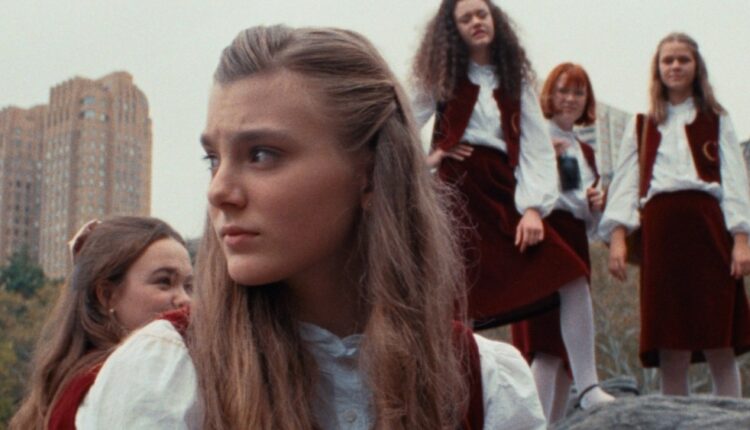So much goes unspoken in “Broken Voices,” Czech director Ond?ej Provazník’s nuanced retelling of the notorious sex scandal that rocked the Bambini di Praga girls choir, rechristened Canticella here. Set in the early 1990s, before the influence of smartphones and social media, the empathy-minded psychological drama follows 13-year-old Karolína (Kate?ina Falbrová), focusing largely on her desire to join the choir’s prestigious concert section, where her slightly older sister already performs.
The intricate dynamics Karolína must navigate in order to be selected for the 10-person tour, already scheduled to visit New York City, would be enough for most films. But this one builds to a devastating finale, exploring a darker subtext wherein the girls’ motives and feelings are implied, but never explicitly confirmed. At once intimate and enigmatic, “Broken Voices” is ultimately more “Picnic at Hanging Rock” than “Pitch Perfect,” especially in the scene where the girls emerge from the boulders in Central Park, offering a variation on this year’s like-minded Slovenian drama “Little Trouble Girls” (about competition within a Catholic girls choir).
Debuting in competition at the Czech Republic’s preeminent film fest, Karlovy Vary, “Broken Voices” was originally entitled “Sbormistr,” which means “Choirmaster” in Czech. Although Karolína is unquestionably the film’s main character, the group’s male guardian, Mácha Vitek, holds nearly all of the power. As played by Juraj Loj, the girls’ imperious, eponymous “master” comes across like a cross between Bradley Cooper and David Koresh: a forbidding (yet undeniably attractive) figure with an intense gaze, long hair and once-stylish wireframe glasses, clearly modeled on real-life culprit, Bohumil Kulínský.
In order to succeed in such a competitive environment, the young rivals must effectively catch Mácha’s eye — a system several keep track of via notepad, tallying the glances he gives each of the girls. Like so many of the film’s details, this seemingly innocent game indicates that the young women realize there’s an element of seduction at play, with some more aware than others of the qualities (besides singing talent) that Mácha is looking for.
To complicate matters, he’s the only man for miles around, which makes him the de facto male upon whom a number of them seem to fixate. Who hasn’t experienced a crush (if not full-blown infatuation) on a teacher? If the same story had been told in the ’90s, when “Broken Voices” is set, it likely would have taken Mácha’s side, treating one or more of the girls like young vixens. In reality, the choirmaster was convicted of having inappropriate sexual relations with 19 of his charges, nearly half of them underage — a number so extreme, it’s hard to see him as anything other than a predator.
Provazník has no interest in being so reductive in either direction. Instead, he uses the film to explore the phenomenon by which the girls’ accounts seemed to contradict one another. How is it that each saw things so differently? How do envy, desire and personal ambition factor into the equation? Such inconvenient emotions are introduced quite subtly in “Broken Voices,” since each of the girls’ primary goal remains being selected for the choir’s touring section.
After noticing Karolína practicing in a younger class, Machá invites her to come aboard as an alternate, joining her sister Lucie (Maya Kintera) at a mountaintop ski resort where they sequestered for several weeks of intense rehearsals. Following the newcomer is a simple but effective narrative strategy, allowing the filmmaker to reveal this unfamiliar world through naive eyes: Karolína arrives late, pelted with snowballs by the other girls at the entrance.
Machá promotes her quickly, leading others to resent her, which explains the prank played upon her in the showers (where someone takes Karolína’s towel and clothes, obliging her to find her way back to her room, wet and naked) or later, betrayed by her own sister. This leaves the girl with no one to trust — not even the elderly female counselor, who picks up on suspicious details (like Machá’s bathrobe in a girl’s room) but makes no effort to intervene. In the lead role, Falbrová gives a breakout performance on par with Anamaria Vartolomei in “Happening” as her expressive eyes invite a wide range of interpretations.
Working carefully with the various departments, Provazník creates a distinctive color palette and feel for the film, emphasizing earth tones like burgundy, brown and amber —colors we might associate with faded family photos from the 1980s. Karolína wears braces on her teeth and thick woolen sweaters, which counteract any illusion of “Lolita”-like precocity. There’s no denying that she’s young and inexperienced, a point reinforced by her body language. With her head down and eyes raised, she looks like a child receiving her First Communion as she gazes up at Machá in class.
One might pick up on echoes of Sofia Coppola throughout — especially “The Beguiled,” in which a lone man is surrounded by young women — as “Broken Voices” emphasizes impressionistic childhood memories that can last a lifetime: collecting exotic crystals, riding the subway, studying adult behavior from across the room. The movie builds to an upsetting sexual encounter, framed not quite off-camera (we see feet the act itself reflected in a TV screen while the world carries on oblivious outside the window). Still, Provazník’s focus is not on trauma, and it’s fitting that such a sensitive, understated treatment of real-world abuse should end on a poignant note of solidarity.


